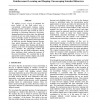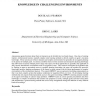34 search results - page 6 / 7 » Action Elimination and Stopping Conditions for Reinforcement... |
ICML
2002
IEEE
14 years 5 months ago
2002
IEEE
We explore dynamic shaping to integrate our prior beliefs of the final policy into a conventional reinforcement learning system. Shaping provides a positive or negative artificial...
ICRA
2009
IEEE
13 years 11 months ago
2009
IEEE
— In this paper, we present a novel approach to controlling a robotic system online from scratch based on the reinforcement learning principle. In contrast to other approaches, o...
BMCBI
2006
13 years 5 months ago
2006
Background: Recursive Feature Elimination is a common and well-studied method for reducing the number of attributes used for further analysis or development of prediction models. ...
CI
2005
13 years 4 months ago
2005
Autonomous agents that learn about their environment can be divided into two broad classes. One class of existing learners, reinforcement learners, typically employ weak learning ...
EWCBR
2008
Springer
13 years 6 months ago
2008
Springer
In this paper we propose an approach to address the old problem of identifying the feature conditions under which a gaming strategy can be effective. For doing this, we will build ...


